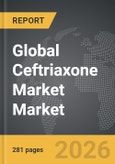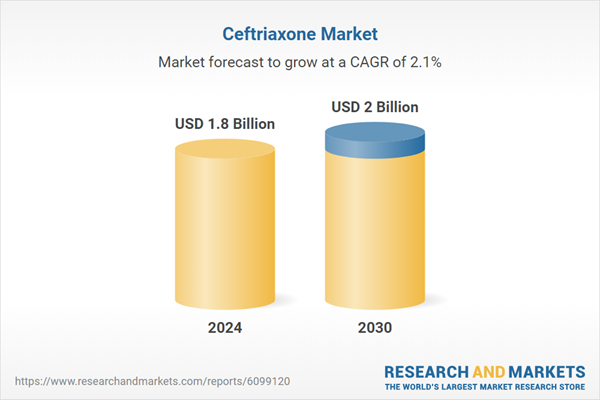Global Ceftriaxone Market - Key Trends & Drivers Summarized
Why Does Ceftriaxone Remain a Critical Antibiotic in Global Infectious Disease Management Protocols?
Ceftriaxone, a third-generation cephalosporin antibiotic, continues to serve as a cornerstone in the treatment of a broad range of bacterial infections, including pneumonia, meningitis, sepsis, urinary tract infections, and gonorrhea. Its broad-spectrum activity, long half-life, and favorable safety profile make it a preferred parenteral therapy across both inpatient and outpatient settings. Widely included in the WHO Essential Medicines List, ceftriaxone is routinely deployed in empiric therapy, particularly in resource-constrained environments and critical care units.As antimicrobial resistance (AMR) intensifies globally, ceftriaxone's dual renal-hepatic elimination, low toxicity, and proven efficacy are helping it retain relevance in first-line treatment protocols - especially when pathogen susceptibility is confirmed or local resistance patterns remain favorable. Its extensive availability in injectable form and stability in varied storage conditions further support its widespread use in public health systems, humanitarian missions, and infection control initiatives across geographies.
How Are Generic Production, Fixed-Dose Combinations, and Global Procurement Programs Shaping Ceftriaxone Market Dynamics?
The patent expiration of branded ceftriaxone has led to extensive generic manufacturing across emerging and developed markets, significantly reducing costs and boosting availability. Generic dominance, particularly in low- and middle-income countries, is being reinforced by centralized procurement frameworks led by public health agencies, multilateral organizations, and NGOs aiming to improve access to essential antibiotics.Ceftriaxone is also increasingly formulated in fixed-dose combinations (FDCs), often paired with beta-lactamase inhibitors (e.g., sulbactam) to enhance efficacy against resistant strains. These combinations are gaining regulatory and clinical traction in nosocomial and multidrug-resistant infection settings. Additionally, ready-to-use formulations and prefilled injectables are gaining favor in high-acuity care environments for faster administration and reduced dosing errors, particularly in emergency care and trauma units.
Where Is Demand for Ceftriaxone Growing and Which Therapeutic Areas Are Leading Utilization?
Asia-Pacific and Africa are key demand centers for ceftriaxone, driven by high infectious disease burdens, ongoing public health campaigns, and government-supported antibiotic supply programs. India remains one of the largest global producers and consumers of generic ceftriaxone, while sub-Saharan Africa depends on it for community-acquired infections and sepsis management. Eastern Europe, Latin America, and parts of the Middle East are also registering stable demand across hospital and ambulatory segments.Primary therapeutic areas include respiratory tract infections, bloodstream infections, bacterial meningitis, pelvic inflammatory disease, and perioperative prophylaxis. Pediatric and geriatric populations, immunocompromised patients, and trauma cases in emergency departments represent high-use segments. In humanitarian and disaster relief contexts, ceftriaxone is a first-line option due to its broad coverage and single-daily dosing regimen, which supports compliance and simplified administration in field conditions.
What Is Fueling the Global Growth of the Ceftriaxone Market?
The global ceftriaxone market is growing on the back of increasing bacterial infection rates, persistent gaps in sanitation and vaccination, and continued reliance on empirical antibiotic therapies in acute care. Its inclusion in international treatment guidelines, widespread clinical familiarity, and compatibility with mass procurement systems reinforce its role as a frontline parenteral antibiotic.Market growth is supported by generic manufacturer expansion, public-private partnerships for infectious disease control, and increased healthcare access in rural and underserved areas. However, antimicrobial stewardship pressures, emerging resistance, and tighter regulations around prescription practices are shaping more judicious and targeted use. As healthcare systems balance access with antibiotic preservation, a defining question shapes the future of this legacy molecule: Can the global ceftriaxone market sustain relevance through responsible usage, formulation innovation, and scalable supply - while adapting to the evolving realities of resistance, stewardship, and equitable infectious disease management?
Report Scope
The report analyzes the Ceftriaxone market, presented in terms of market value (US$). The analysis covers the key segments and geographic regions outlined below:- Segments: Indication (Urinary Tract Infections, Intra-Abdominal Infections, Endocarditis, Acute Bacterial Otitis Media, Meningitis, Pneumonia, Other Indications); Distribution Channel (Hospital Pharmacies, Retail Pharmacies, Online Pharmacies).
- Geographic Regions/Countries: World; United States; Canada; Japan; China; Europe (France; Germany; Italy; United Kingdom; Spain; Russia; and Rest of Europe); Asia-Pacific (Australia; India; South Korea; and Rest of Asia-Pacific); Latin America (Argentina; Brazil; Mexico; and Rest of Latin America); Middle East (Iran; Israel; Saudi Arabia; United Arab Emirates; and Rest of Middle East); and Africa.
Key Insights:
- Market Growth: Understand the significant growth trajectory of the Urinary Tract Infections Indication segment, which is expected to reach US$621.5 Million by 2030 with a CAGR of a 2.7%. The Intra-Abdominal Infections Indication segment is also set to grow at 2.1% CAGR over the analysis period.
- Regional Analysis: Gain insights into the U.S. market, valued at $489.6 Million in 2024, and China, forecasted to grow at an impressive 4.1% CAGR to reach $383.2 Million by 2030. Discover growth trends in other key regions, including Japan, Canada, Germany, and the Asia-Pacific.
Why You Should Buy This Report:
- Detailed Market Analysis: Access a thorough analysis of the Global Ceftriaxone Market, covering all major geographic regions and market segments.
- Competitive Insights: Get an overview of the competitive landscape, including the market presence of major players across different geographies.
- Future Trends and Drivers: Understand the key trends and drivers shaping the future of the Global Ceftriaxone Market.
- Actionable Insights: Benefit from actionable insights that can help you identify new revenue opportunities and make strategic business decisions.
Key Questions Answered:
- How is the Global Ceftriaxone Market expected to evolve by 2030?
- What are the main drivers and restraints affecting the market?
- Which market segments will grow the most over the forecast period?
- How will market shares for different regions and segments change by 2030?
- Who are the leading players in the market, and what are their prospects?
Report Features:
- Comprehensive Market Data: Independent analysis of annual sales and market forecasts in US$ Million from 2024 to 2030.
- In-Depth Regional Analysis: Detailed insights into key markets, including the U.S., China, Japan, Canada, Europe, Asia-Pacific, Latin America, Middle East, and Africa.
- Company Profiles: Coverage of players such as 3M Company, AngioDynamics Inc., B. Braun Melsungen AG, Becton, Dickinson and Company, Biomerics LLC and more.
- Complimentary Updates: Receive free report updates for one year to keep you informed of the latest market developments.
Some of the 32 companies featured in this Ceftriaxone market report include:
- ACS Dobfar S.p.A.
- Aurobindo Pharma Ltd.
- Baxter International Inc.
- Cipla Ltd.
- CSPC Pharmaceutical Group
- Daewoong Pharmaceutical Co., Ltd.
- F. Hoffmann-La Roche Ltd.
- Fresenius Kabi AG
- GlaxoSmithKline plc
- Hikma Pharmaceuticals PLC
- Lupin Pharmaceuticals, Inc.
- Mylan N.V. (now part of Viatris)
- Nectar Lifesciences Ltd.
- Novartis AG
- Orchid Pharma Ltd.
- Pfizer Inc.
- Qilu Pharmaceutical Co., Ltd.
- Sandoz International GmbH
- Sinopharm Weiqida Pharmaceutical Co., Ltd.
- Teva Pharmaceutical Industries Ltd.
This edition integrates the latest global trade and economic shifts into comprehensive market analysis. Key updates include:
- Tariff and Trade Impact: Insights into global tariff negotiations across 180+ countries, with analysis of supply chain turbulence, sourcing disruptions, and geographic realignment. Special focus on 2025 as a pivotal year for trade tensions, including updated perspectives on the Trump-era tariffs.
- Adjusted Forecasts and Analytics: Revised global and regional market forecasts through 2030, incorporating tariff effects, economic uncertainty, and structural changes in globalization. Includes historical analysis from 2015 to 2023.
- Strategic Market Dynamics: Evaluation of revised market prospects, regional outlooks, and key economic indicators such as population and urbanization trends.
- Innovation & Technology Trends: Latest developments in product and process innovation, emerging technologies, and key industry drivers shaping the competitive landscape.
- Competitive Intelligence: Updated global market share estimates for 2025, competitive positioning of major players (Strong/Active/Niche/Trivial), and refined focus on leading global brands and core players.
- Expert Insight & Commentary: Strategic analysis from economists, trade experts, and domain specialists to contextualize market shifts and identify emerging opportunities.
Table of Contents
Companies Mentioned (Partial List)
A selection of companies mentioned in this report includes, but is not limited to:
- ACS Dobfar S.p.A.
- Aurobindo Pharma Ltd.
- Baxter International Inc.
- Cipla Ltd.
- CSPC Pharmaceutical Group
- Daewoong Pharmaceutical Co., Ltd.
- F. Hoffmann-La Roche Ltd.
- Fresenius Kabi AG
- GlaxoSmithKline plc
- Hikma Pharmaceuticals PLC
- Lupin Pharmaceuticals, Inc.
- Mylan N.V. (now part of Viatris)
- Nectar Lifesciences Ltd.
- Novartis AG
- Orchid Pharma Ltd.
- Pfizer Inc.
- Qilu Pharmaceutical Co., Ltd.
- Sandoz International GmbH
- Sinopharm Weiqida Pharmaceutical Co., Ltd.
- Teva Pharmaceutical Industries Ltd.
Table Information
| Report Attribute | Details |
|---|---|
| No. of Pages | 281 |
| Published | February 2026 |
| Forecast Period | 2024 - 2030 |
| Estimated Market Value ( USD | $ 1.8 Billion |
| Forecasted Market Value ( USD | $ 2 Billion |
| Compound Annual Growth Rate | 2.1% |
| Regions Covered | Global |









